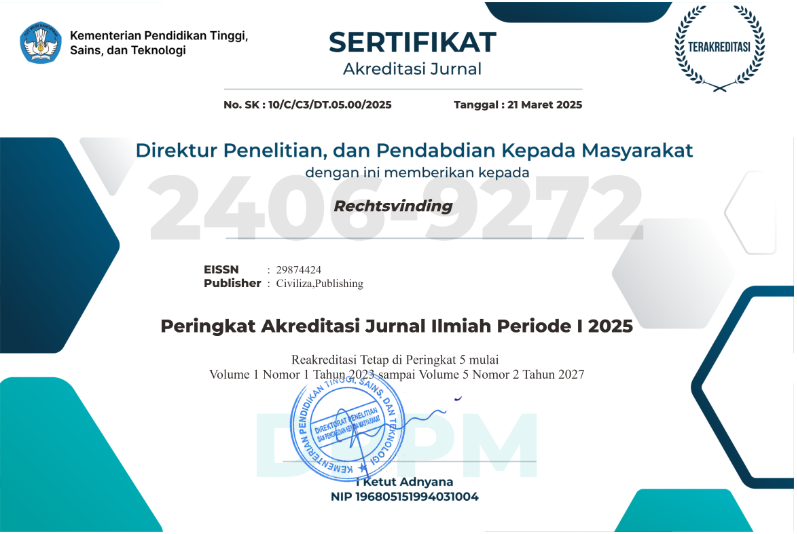Non Conviction Base (NCB) Asset Forfeiture Regarding the Recovery of Assets from the Proceeds of Corruption Crimes
DOI:
https://doi.org/10.59525/rechtsvinding.v3i1.661Keywords:
Non-Conviction Based; Assets; Corruption;Abstract
Non-Conviction Based Asset Forfeitureas a new formulation in efforts to return assets resulting from corruption crimes can be adopted into the Indonesian national legal systemas an effort to restore state losses to the maximum. The state losses that have been returned are still not comparable to the state losses that actually exist due to corruption.The research method used is normative juridical law or library legal research (search library), by analyzing literature or secondary data relevant to the topic. This research is descriptive analytical, the data obtained and processed and analyzed to provide a comprehensive picture of the legal regulations on Non Conviction Base (NCB) Asset Forfeiture against the Asset Confiscation Bill with data collection methods through document studies. The results of the study show that asset confiscation without criminalization orNon-Conviction Based Asset Forfeitureis a major breakthrough regarding the return of state wealth (asset recovery) issued by UNCAC in 2003. The conceptNCB Asset Forfeiturein essence is the seizure of assets from the perpetrator of a crime without any prior legal process. So in this case, the seizure is carried out in a civil manner (in brake) and is aimed at the perpetrator's assets without going through a criminal process.
References
Sudarto, Hari Purwadi, and , Hartriwiningsih. 2018. “Asset Confiscation Mechanism Using Non-Conviction Based Asset Forfeiture as an Effort to Recover State Losses Due to Corruption.” Journal of Law and Economic Development 5 (1): 109–18. https://doi.org/10.20961/hpe.v5i1.18352.
Ananda Kurniawan. 2019. “Academic Paper on the Law of Returning Assets from Corruption.” Angewandte Chemie International Edition, 6(11), 951–952., 1–23.
Dhiavella, Khairunnisa, and Nathalina Naibaho. 2024. “Asset Confiscation in Efforts to Recover Assets Proceedings of Corruption in Indonesia” 4 (5): 1966–73.
Hafid, Irwan. 2021. “Asset Confiscation Without Criminal Charges in the Perspective of Economic Analysis of Law.” Lex Renaissance Journal 6 (3): 465–80. https://doi.org/10.20885/jlr.vol6.iss3.art3.
Hamdi, Muhammad Arief. 2018. “Prevention of the Transnational Criminal in Indonesia.” Scientific Journal of Immigration Studies 1 (1): 165–75. https://doi.org/10.52617/jikk.v1i1.20.
Harahap, Muslim, Mhd. Ansor Lubis, Hera Fauziah Lubis, and Angga Rizky. 2023. Reflection on Criminal Law Politics. Eureka Media Aksara. Eureka Media Aksara.
HR, L. A., Kesumah, F. S. D., & Huzaimah, R. F. (2025). Impact and Acceptance of Digitalization in the Indonesian Workplace. Indonesian Journal of Islamic Economics and Finance, 5(1), 1–14. https://doi.org/10.37680/ijief.v5i1.6697
“APBD Corruption; Kendal Regent on Trial, Allegedly Received Rp 24.3 Billion.” 2007. ICW. 2007. https://antikorupsi.org/id/article/korupsi-apbd-bupati-kendal-diadili-diduga-terima-uang-rp-243-miliar.
Lisa ira, Yeni Lisa Sitorus, Lidya Erdawati, Veronika Laurensia Yolanda Br Nababan, Dewi Hariyanti. 2024. “Corruption Crimes Through the Ratification of the Asset Confiscation Bill.” Jurnal Res Justitia: Jurnal Ilmu Hukum 4: 458–69.
Lubis, Mhd. Ansor, Hera Fauziah Lubis, and Rizkan Zulyadi. 2024. Introduction to State Science Complete with Classical to Modern Forms of State and Government. Eureka Media Aksara. Eureka Media Aksara.
Maharani, Riefda Nardi, Azkia Nur Aulia, Muhammad Nail Athallah, and Ananda Rafli Haritsah. 2025. “Legal Analysis of Corporations with Alleged Exploitation of 1,047 Indonesian Students by Corporations in Internship Programs In” 3: 1–10. https://doi.org/10.59525/rechtsvinding.v3i1.539.
Mhd Ansor Lubis. 2024. “The Perspective of the Community in the Medan City Sub-District on the Open and Closed Proportional Representation Electoral System” 23 (3): 1–30.
Muntahar, Teuku Isra, Madiasa Ablisar, and Chairul Bariah. 2021. “Confiscation of Corruption Assets Without Criminalization in a Human Rights Perspective.” Iuris Studia: Journal of Legal Studies 2: 49–63. https://doi.org/10.55357/is.v2i1.77.
Nasutioan, Bismar. 2009. “Anti Money Laundering: Theory and Practice.” In Anti Money Laundering: Theory and Practice, 149. Bandung: Books Terrace & Libray.
Rachmarani, Fitri Aliva, Anita Afriana, and Rai Mantili. 2024. “Analysis of In Rem Lawsuits in the Draft Law on Asset Confiscation Based on the Perspective of Indonesian Civil Procedure Law Mochtar Kusumaatmadja's Development Law Theory Emphasizes That Law Is Not Limited to a Collection of Static Rules, But Is an Instrument” 8: 45–62.
Ridwansyah, R., & Mujahid, A. (2025). The Impact of Islamic Corporate Governance, Corporate Social Responsibility, and Sustainability Reporting on Financial Performance: A Quantitative Analysis of Islamic Banks in Asia (2017–2023). Indonesian Journal of Islamic Economics and Finance, 5(1), 15–28. https://doi.org/10.37680/ijief.v5i1.6883
Rozah, Umi, and Nashriana Nashriana. 2023. “Criminal Policy Analysis and Philosophy of Non-Conviction Based Forfeiture of Stolen Assets in Corruption Crimes.” Journal of Indonesian Legal Development 5 (3): 411–32.
Rustamaji, Muhammad, Bambang Santoso, and Itok Dwi Kurniawan. 2024. “Ending the Polemic of Civil Aspects in Eradicating Corruption (Comparative Study of NCB Asset Forfeiture Optimization)” 7 (1): 194–207.
Saputra, Refki. 2017. “Challenges in Implementing Nonconviction Based Asset Forfeiture in the Asset Confiscation Bill in Indonesia.” Integritas: Jurnal Anti Korupsi Vol. 3 (1): 115–30. https://jurnal.kpk.go.id/index.php/integritas/article/view/158.
Sukarno. 2018. “Implementation of Asset Confiscation in Indonesia as an Effort to Recover State Losses in the Perspective of State Finance.” Indonesian Treasury Review Journal of State Treasury Finance and Public Policy 3 (4): 296–311. https://doi.org/10.33105/itrev.v3i4.74.
Syarafi, Teuku. nd "Corruption Concritization Of Criminal Objectives Through Asset Confirmation Of."
Webb, Philippa. 2010. “Implications of Asset Confiscation for Third Parties Involved in Corruption Crimes.” University of Indonesia.
Downloads
Published
How to Cite
Issue
Section
License
Copyright (c) 2025 H. A. Lawali Hasibuan

This work is licensed under a Creative Commons Attribution 4.0 International License.








